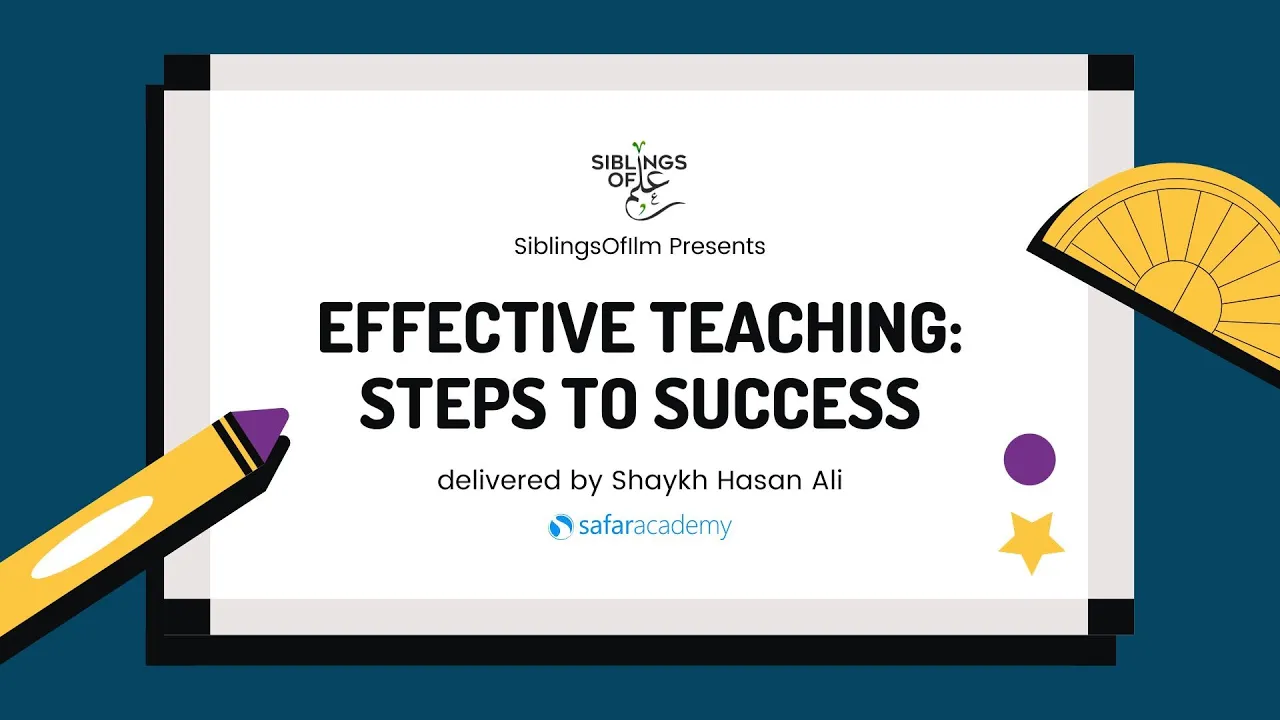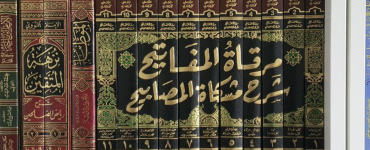A dear friend recently asked me for some advice regarding teaching. I shared a few thoughts over WhatsApp based on personal experience and observations. I don’t claim to be an expert, but I’ve written them here in the hope that they may benefit someone, even in a small way.
1. Sincere Intention
Begin with the intention of seeking the pleasure of Allah. Alongside this, have multiple noble intentions — preserving and passing on knowledge, serving the Dīn, helping others grow, and fulfilling an amanah.
2. Don’t Overestimate Students
As a teacher, it is likely that you were among the stronger students in your class and may have found learning easier than many of your peers.
While this was an advantage during your student days, it can become a challenge when teaching. Avoid overestimating your students’ ability to grasp concepts quickly. Do not rush, and do not assume that everything will be as easy for them as it was for you.
A truly excellent teacher is one who can meet students at their level, explain clearly, and guide them patiently until they understand.
3. Prepare Beyond the Text
Prepare thoroughly for your lessons. Don’t limit yourself to the book you are teaching; rather, explore the key books in that subject. For example, if you are teaching Arbi ka Muallim, also review other books designed to introduce Arabic to non-speakers. Observe their styles and examples — this will deepen your understanding of different approaches to explanation.
Immerse yourself fully in the ocean of that science, but don’t overwhelm your students with everything you discover. Instead, share with them the most valuable pearls you have found.
4. Curiosity Fuels Growth
Recognising — and even embracing — your own ignorance is key to growth. Never feel you “already know.” Adopt a mindset of inquiry.
Instead of thinking “Yes, I already know this” , let questions fill your mind whenever you sit down to prepare a lesson: What? Where? When? How? What if? But why?
This curiosity will open the floodgates of understanding and lead you to deeper knowledge.
5. Take Responsibility
Always start by holding yourself accountable. If you constantly blame the students for not understanding, you will never pause to reflect on or improve your teaching methods.
But if you take responsibility for their learning, you will naturally look for new ways to explain, simplify, and reach them more effectively.
6. Transmit Passion, Not Just Content
Your passion and enthusiasm are contagious. When students see your love for the subject and the effort you put into preparing, it inspires them. Their zeal and passion for a book or science often mirror yours. The more enthusiastic and well-prepared you are, the more likely they are to develop a genuine love for the subject.
Remember, your role is not just to teach a book — you are passing on both knowledge and a love for learning itself.
7. Stay Focused in Class
During class, keep the focus firmly on the subject. Don’t waste time discussing unrelated topics. When teaching Naḥw, stick to Naḥw — avoid digressing into Fiqh, Ḥadīth, or Qurʾān discussions.
Be in the classroom (or waiting outside) before the appointed time, and begin your lesson promptly. Make the subject itself engaging and enjoyable so there is no need for unrelated conversations to keep students interested.
You know you’ve had a good class when you say, “Time’s up,” and the students look at the clock in surprise, wondering where the time went.
8. Respect Time
End your class on time — even if you haven’t finished the point you were explaining. Respecting the schedule shows consideration for other teachers and for students’ breaks, and punctuality is an important part of adab.
If there is another class after yours, be mindful not to continue while another teacher is waiting. Even if yours is the last class before a break, try to finish on time — students need their rest, and it is important not to take away from that.
Also, avoid assuming that students who wish to leave on time lack zeal for knowledge. They may have other commitments and responsibilities that need their attention.
Aim to be on time for class and to finish on time. Respecting time sets a good example and encourages others to respect it as well.
9. Admit When You Don’t Know
If you don’t know something, simply say so — there is no shame in admitting it. Pretending to know misleads students and betrays the trust placed in you as a teacher.
Making up answers or acting as though you know when you don’t is dishonest and harmful. True humility builds credibility and earns students’ respect, whereas false confidence damages both your integrity and their learning.
10. Avoid Oppression in All Forms
Speaking harshly, ridiculing, or belittling students — whether inside or outside the classroom — is never acceptable. Name-calling, hurting someone’s feelings, getting angry without just cause, or mocking a student for their weakness are all forms of oppression.
Being a teacher does not make such behaviour permissible. In fact, as an Islamic teacher, the responsibility is even greater — the harm is twofold: one for the injustice itself, and another for the poor image it gives of knowledge and the people of knowledge.
11. Earn Respect, Don’t Beg For It
Respect should not be begged for — it should be earned. Let it come through your teaching, your conduct, your character, and the care and love you show your students.
12. Be a Servant-Leader
سَيِّدُ القَوْمِ خَادِمُهُمْ
“The leader of a people is their servant.”
As the leader of the class, avoid creating an environment where students feel pressured to serve you, bring gifts, or treat you in a way that sets you apart from the rest of the class. Nafiʿ used to say: “I would accompany ʿAbdullāh ibn ʿUmar on his journeys intending to serve him, but it would be he who served me.”
If your students are eager to serve, channel their enthusiasm towards serving the madrasah, supporting its work, or assisting with academic research. This benefits them by allowing them to help their teachers while engaging in meaningful learning. Do not misuse their admiration for personal gain.
13. Balance Formality and Openness
Maintain moderation in the classroom. Create an environment where students feel comfortable asking questions, sharing their thoughts, and — in higher-level books — even respectfully discussing or disagreeing with your research or comments.
At the same time, ensure that the atmosphere remains disciplined and respectful. Avoid letting things become so informal that students talk out of turn or lose respect for the class and teacher. The balance between openness and respect is what fosters true learning.
14. Respect Differences and Teach Adab
Model respectful disagreement and show the utmost respect for other scholars, past and present. Practically demonstrate to your students the proper etiquettes of differing opinions.
Broaden their horizons by helping them appreciate the diversity of rulings and interpretations within Islamic scholarship. This not only deepens their understanding but also nurtures maturity and humility.
15. Value Every Student
Never underestimate a student. Treat each one as a future leader or imam — even if they appear weak or insignificant now. You may not see their potential today, but they could grow into great contributors.
Even if a student does not become a teacher or enter an academic field, one day they will likely be a parent or grandparent, shaping the lives of their children and family. Through them, the influence of your teaching can reach many.
Conversely, a student who is neglected or mistreated could, Allah forbid, grow into someone who misguides others. The impact of how we treat our students can echo far beyond the classroom.
16. Leave Room for Exit with Dignity
While pursuing secondary or tertiary knowledge is a great virtue, it is not obligatory (farḍ) for everyone. If a student finds it too difficult to continue and decides to step away, respect their decision. Advise and encourage them where possible, but if they still feel this path is not for them, allow them to leave with dignity and honour.
Do not treat them as a failure, reject, or — worse — as if they have turned away from religion. Belittling or ridiculing them could drive them away not only from you and your institute but from knowledge, scholars, and — Allah forbid — from the dīn itself.
You never know what role Allah has destined for them elsewhere, and perhaps He has planned something even better for them.
17. Encourage Practice, Not Just Theory
Try to instil in your students a genuine love for worship — both farḍ and nafl — and good character. Do this by gently encouraging them and making them aware of its virtues and importance, so that worship, good deeds and good character become a natural part of their lives and something they personally desire to do.
Avoid forcing or pressuring them, as the goal is for these actions to flow from their own hearts rather than being done out of fear or compulsion.
Again, these are just reflections — shared sincerely and with the hope that they serve as a reminder first and foremost to myself.
Wassalāmu ʿalaykum wa raḥmatullāh
Written by Shaykh Hashim Mohamed (www.alqalaminstitute.org)
Teachers may also benefit from our webinar titled ‘Effective Teaching: Steps to Success’ delivered by Shaykh Hasan Ali

Watch now via the SiblingsOfIlm YouTube channel
Watch this series to learn about the teaching method of the Prophet (peace be upon him).






